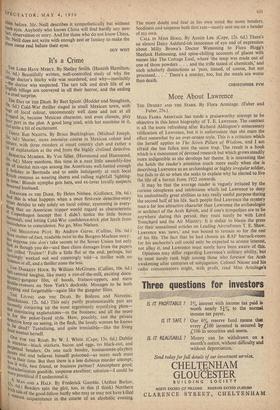Their Glories Past
TWILIGHT OF THE MAHARAJAS. By Sir Kenneth Fitze. Murray, 15s.) THIS is a curious set of books. Sir Kenneth Fitze and Mr. Evans Thomas both have extremely good subjects. One is the vanished world world of the Indian Maharajas; the other the vanished noelet) i! of the Western businessmen in China. Both societies, though talc9' for granted by Englishmen a generation ago, were extraordina,11; They produced extravagances of incident and personality vvlec* it is already sometimes difficult to believe were posSible. Both worlds were abruptly destroyed, the one by the Indian Govere: ment taking over the Indian States after the withdrawal of d4` British, the other by the surrender of the concessions in China an the triumph of Communism. Within a very few decades of the first French Revolution, Taine commented on the difficulty of Piaci; together what life had really been like in the ancien regime. Se",0 the life of these other two vanished societies will be hard0 re-create. Alas, neither Sir Kenneth Fitze nor Mr. Evans Th°111" will be remembered as an informative source book. ; c Sir Kenneth. Fitze's failure is sad. He held high office .11 „ thd Political Service in India, and has a great deal of knowledge a" experience to draw on. Perhaps he felt the need to be discreet; ; even today, a retired officer of the Political Service could Perhart.)si hardly write like Mr. J. R. Ackerley. But other officials in the Pas have written informatively and interestingly. Sir Kenneth neither conveys the atmosphere of the States in which he served no discloses any of the interesting facts of the diplomatic his!°e, of their relations with the Paramount Power during his fate Some of these facts are still mysterious, and must one daqie investigated. Sir Kenneth's choice of title is strange. .!,e, Maharajas passed in a few months from prosperity to total echPce 'They had no twilight. During the years of ,Sir Kenneth's servi 0 most of them were basking in the sun, and his book makes :III effort to examine in detail the brief period in which their down1 was brought ,about. Sardar Vallabhbhai Patel, their hanuner.5 mentioned only once in the index, and that extraordinary Person. Mr. V. P. Menon, not at all. Mr. Evans Thomas, a banker of the Chartered Bank, fails in rather the same way. He went to China in 1911, the year of .110 fall of the Manchu Empire, and lived there for more than of .110 years, part of the time in Peking, which at that period vv,i, probably the strangest, most beautiful and most interesting jilt of the world. Who, reading Mr. Evans Thomas, could
that Peking was the same place as that described by Putnam We'
or Daniele Vare? Yae Mr. Desmond Neill's book is better. He joined the Male io Civil Service after the war and was sent to Fukien provinee..3 China to learn the language and customs of the part of Cla..'d from which have come most of the Chinese in Singapore;: while there he visited also Shanghai and Peking. His visit to"., place at the time when the Kuomintang was losing the civil vinaLt but he was not present at the crucial moments, and does cua describe the scenes of the Kuomintang's rout. That haPPee_ei when he was back in Malaya. Mr. Neill followed the accustotnco path of the inquisitive and sensitive visitor to China, and 141 trouble is that the accustomed path has been written about eitelt before. Mr. Neill describes it sympathetically but without fresh eyes. Anybody who knows China will find hardly any new act, observation, or story. And for those who do not know China, Mr. Neill does not write with enough zest or fantasy to make the Place Come real before their eyes.
GUY WINT











































 Previous page
Previous page